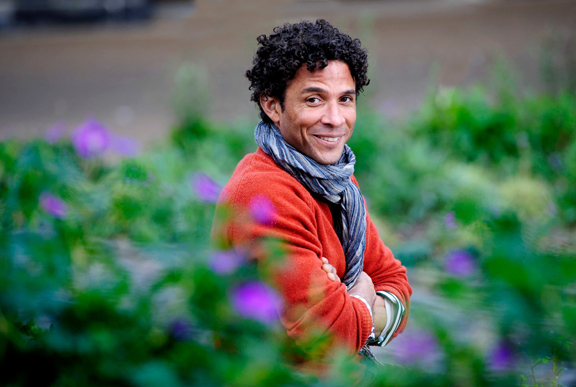Scottish start-up brings farming to the table with IoT technology

Low Carbon Ideas Lab Winners, Jason Morenikeji atUrban Farming Company
A Scottish start-up is bidding to educate children about biology, tackle childhood obesity and bring nature back to the home through the design of an Internet of Things (IoT), Tamagotchi-style toy for plants.
Urban Farming Company, a social enterprise established 12 months ago, has designed Table Farm, a smart, educational toy aimed at the pre-teen market. With a seed, container, soil, cartridge pack and built-in light and water systems, the toy gamifies growing plants through an app; encouraging children to learn about where food comes from and how it is cultivated.
The plant incubator will guide kids through the journey of a plant’s life, all the way from seed to consumption. Along the way, users will learn about how plants grow and react to different stimuli, through a series of challenges; with its condition displayed by an avatar within the app.
A 2015 survey from Linking Environment and Farming found that children have a worrying lack of knowledge about the source of their food. Among its findings, the poll discovered that 5% of children think strawberries grow in fridges, 4% believe potatoes come from pigs, 28% don’t know that carrots grow underground and 78% do not realise broccoli grows on a plant.
Jason Morenikeji, founder of the Urban Farming Company, said: “Study after study shows that parents are anxious about the increasing dislocation between children and their natural environment – kids are gradually losing their knowledge of where food comes from and how it grows. That’s a clear gap in our collective knowledge that Table Farm seeks to address.
“Essentially Table Farm is an educational toy, with a built-in sustainability narrative, that teaches kids where vegetables and plants come from, how they grow, and what they need to reach their full potential. Children are encouraged to interact with the plant through daily challenges and updates – they can even personalise how they grow it, share progress and compete with friends.
“Our hope is that the product will help kids get a better understanding of where their food comes from, and address health issues such as poor eating habits and obesity, with the ultimate idea being to drive behavioural change.”
The Urban Farming Company, based at the Edinburgh Centre of Carbon Innovation, received initial funding support from Design in Action. It has relationships with a range of academic institutions, including the University of Edinburgh and the University of Strathclyde.
Among the many by-products of its research, Table Farm could be used to understand how plants react to different kinds of light and eventually inspire new methods for intensive farming – for example, helping low-income farmers in developing countries improve food security. A full launch of Table Farm is pencilled in mid- 2017, with the company looking to scale up to a five-person operation.
The company is also working with CENSIS, the Scottish Innovation Centre for Sensor and Imaging Systems, to take its technology to the next stage. The Urban Farming Company is one of the first businesses to use CENSIS’s Connected Device Development Centre (CDDC), which aims to help SMEs fast-track the development of new IoT-related products.
Jason added: “We’re still at the early stages of this project, but there has been a lot of progress and interest already. Our market research is very much an iterative process – we are continually talking to children to understand their views about plants and technology; using their input to inform the gameplay design. It will be designed by kids, for kids.
“Ultimately, Table Farm will be a learning aid that will enhance wellbeing and support school curricula by educating children in multiple disciplines: food, the environment, science and social studies, to name a few. Its impact could even be much wider, as we look at some of the knowledge it could unlock in related areas: how plants react to different wavelengths of light, the effects of a variety of stimuli and the lessons that can be learned for growing plants in urban locations.”
Kevin Power, Software Systems Architect at CENSIS, commented: “We set up the CDDC to support innovative organisations like the Urban Farming Company by helping them build end-to-end IoT products and services. It’s a great example of how the IoT, which has been a fairly abstract concept until recently, can be employed to solve some of the world’s most pressing challenges.
“Interest in the CDDC has been high since its launch nine months ago. We currently have five projects on show, ranging from environmental monitoring to smart agriculture. Scotland has the opportunity to be a world-leader in IoT technologies, and we would encourage every company, whether technically focussed or not, to give serious thought to how this technological revolution could transform the way it does business.”
Comment on this article below or via Twitter @IoTGN

